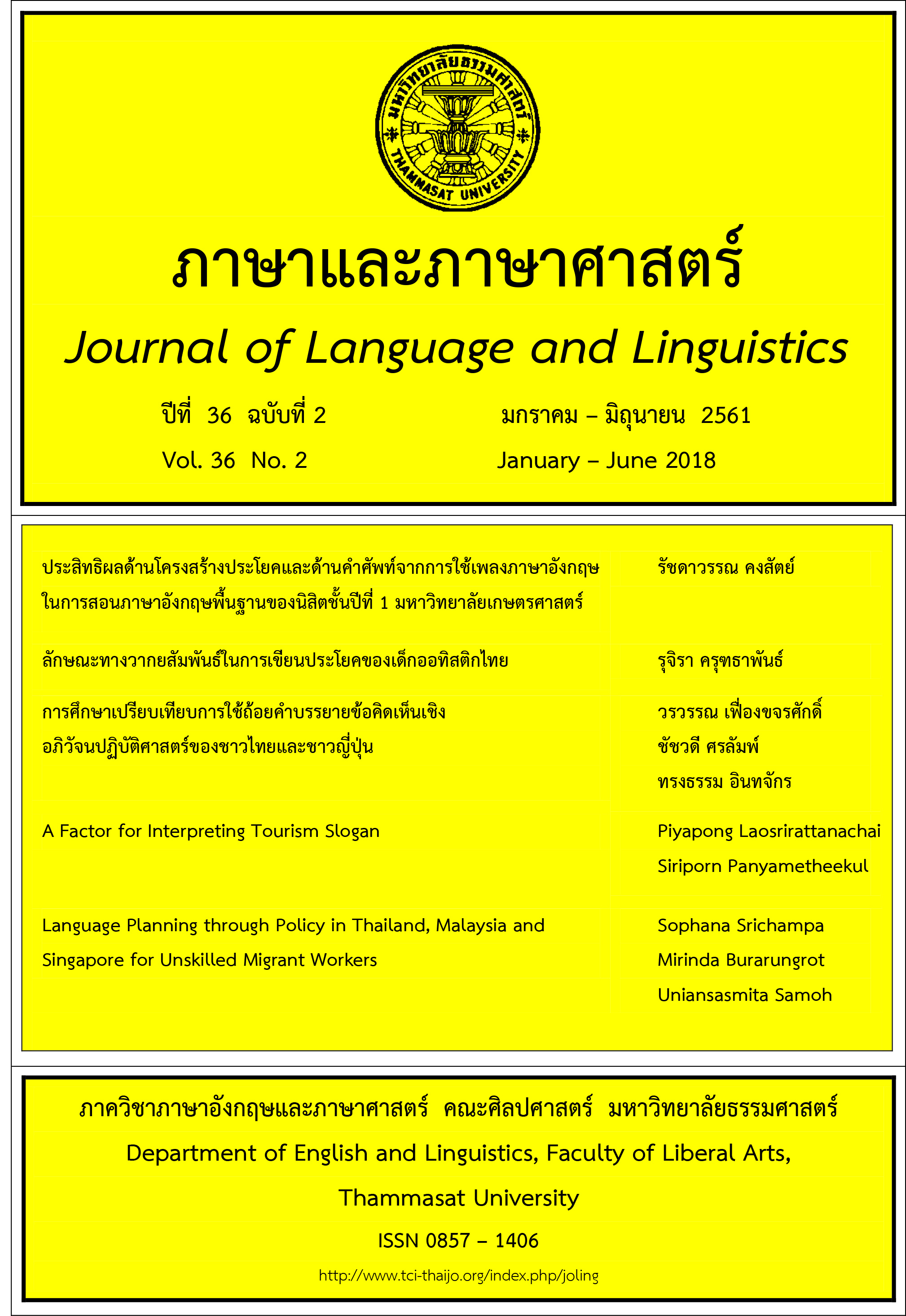A Factor for Interpreting Tourism Slogan
Main Article Content
Abstract
Slogan language is studied in large scale using many linguistic theories including pragmatic theory. Various kinds of products’ slogans have been analyzed but tourism slogans have not seen much attention linguistically. This study investigated the role of pragmatics in understanding tourism slogans. The data in this study were 113 tourism slogans analyzed using a variety of pragmatic analytical tools: implicature, maxims, presuppositions, and speech acts. The results have shown that to understand the purposes of the slogans pragmatics were indeed needed since statistics has shown that 100% of tourism slogans needed sub-disciplines of pragmatic competence i.e. maxims, pragmatic function of presuppositions and speech acts. Also, 95.58% of tourism slogans needed conversational implicature to understand the intention of the slogans.
Article Details
บทความทุกบทความเป็นลิขสิทธิ์ของภาษาและภาษาศาสตร์
References
Bach, K. & Harnish, R. M. (1979). Linguistics Communication and Speech Acts. Cambridge: MIT Press.
Baker, M. (1992). In Other Words: A Coursebook on Translation. London: Routledge.
Brown, G. & Yule, G. (1983). Discourse Analysis. Cambridge: Cambridge University Press.
Cook, G. (1992). The Discourse of Advertising. London: Routledge.
Frege, G. (1892). On Sense and Reference, in P.Geach and M. Black (eds.) (1996),
Translation from the Philosophical Writings of Gottlob Frege, Blackwell, Oxford, 56-78.
Ge, L. (2011). Pragmatic Functions of Presupposition in Advertising English. Asian Culyure and History. 3(1), 153-157.
Grice, H. P. (1967). Logic and Conversation. Unpublished MS. Of the William James Lectures, Harvard University.
Grice, H. P. (1975). Logic and Conversation. In Cole, P. & Morgan, J. (eds) Syntax and Semantics, vol 3: Speech Acts, 43-58. New York: Academic Press.
Grundy, P. (2008). Doing Pragmatics. London: Hodder Education.
Hudson, G. (2000). Essential Introductory Linguistics. Michigan: Blackwell Publishers Inc.
Kohli, C., Leuthesser, L. and Suri, R. (2007). Got slogan? Guidelines for Creating Effective Slogans. The Journal of the Kelley School of Business, 50, 415-422.
Laosrirattanachai, P. (2017). An Analysis of Slogans of Airline Business Using Ideational Metafunction. Humanities Journal, 25(1), 316-343.
Levinson, S.C. (1983). Pragmatics. Cambridge: Cambridge University Press.
Saeed, J. I. (2016). Semantics. (4th ed.) Oxford: Blackwell: Publishers.
Searle, J. R. (1976). The Classification of Illocutionary Acts. Language in Society, 5, 1-23.
Searle, J. R. (1979). Expression and Meaning. Cambridge: Cambridge University Press.


